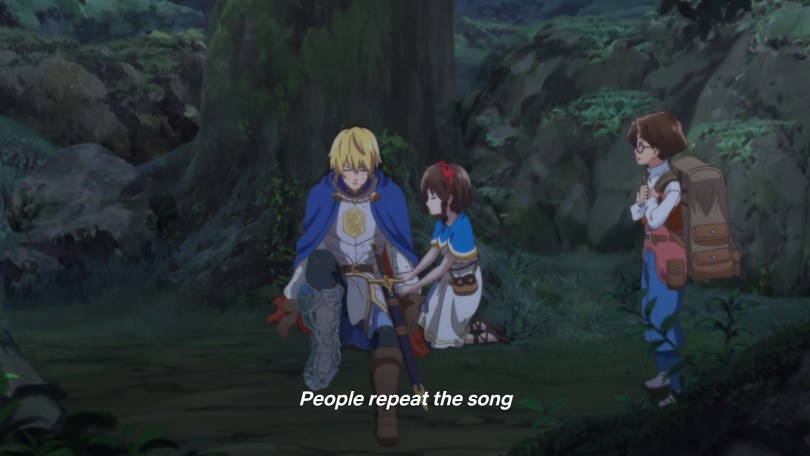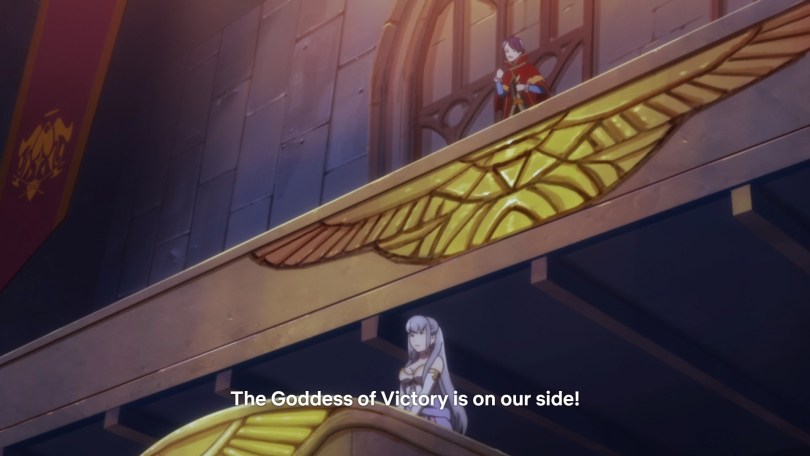What’s it about? In the Capital, Lady Finis uses the power of her song to bring water to the people of her country at a festival. She is beloved by the people, but betrothed to the warmongering Prince Rudo. Meanwhile, in the rural Dandera Village, a young girl named Rin longs to see the capital and sing with the royal orchestra, but her grandfather has forbidden her from singing. When Rin meets an injured knight in the forest, she sings for him, and something strange happens…
Most Netflix original anime have been of a certain type. I’m not talking about stuff that was produced independently that Netflix subsequently purchased the exclusive rights to, but the series that the streaming service specifically threw money at. Sword Gai -the Animation-, B: The Beginning, Devilman Crybaby… they’re all gritty, violent, action-driven stories. The kind of series that men call “real anime” while decrying how moe and SJWs have sullied their precious medium.
Lost Song breaks that pattern.

With its bright colors, musical interludes, and cartoony animation, Lost Song resembles nothing so much as a Disney Channel princess cartoon aimed at eight-year-olds. I wouldn’t have been surprised to see little birds helping Rin or Finis get dressed or start twittering along with their songs.
But this isn’t the kind of Disney movie that approaches its characters with nuance or puts complex ideas in a way that young children can understand. Oh no, not at all. This is a Saturday Morning Cartoon where the good guys are pretty and sing and only ever use their powers to help others, while villains with bad haircuts and Resting Bitch Face kidnap them and force them to do EVIL and it’s all just so very tragic until the handsome prince comes along to rescue them.
Okay, that last part is an assumption, but the knight Rin saves is chivalrous, blonde, and blandly handsome. And he’s on the run from that villainous, unflatteringly coiffed prince who’s determined to force Finis to use her power for war. Perhaps Rin will use her song powers to aid Finis, or Finis figures out a way to save herself.

But let’s take a look at Rin for a minute here. Rin, a young girl who appears to be on the cusp of puberty, has a special power she shares with only one person in the world. However, the older male authority figure in her life forbids her from using it, and as a result she has little understanding of it beyond, “Good things happen when I sing.” The other male figure in her life—her little brother Al—denies the power’s existence, calling it “scientifically implausible.”
The male figures in Rin’s life are determined to deny her potential. One, older and more knowledgeable, recognizes it and doesn’t want her to wield it. The other has been taught that it can’t possibly exist, because it doesn’t fit in with the worldview he’s been taught. She can sense it within herself, despite their efforts to quash it.
Her older sister, Mel, is the only one who recognizes it and enables it, and starts Rin down the path to adventure and growth by switching chores with her, so that Rin meets the knight who can guide her to the capital.

However, Rin pays a steep price: when she goes back home, she finds her village on fire, with Mel and her grandfather murdered by soldiers. She has no choice but to go on the adventure now, to develop her power until her journey converges with Finis’s. Is this punishment for defying her grandfather? Or a necessary sacrifice to growth?
Paralleling Rin’s initial situation, Finis also must face a man seeking to control her power. Unlike Rin, she developed her powers in a more cosmopolitan, accepting environment. However, that put a target on her back, and now the prince wants to marry her in order to use her powers for his own selfish ends.
In a patriarchal world, exceptional women have two options: either hide their specialness away and live in obscurity, or try to use your talents and be exploited by the system.

My hope—my greatest, most desperate hope for this series—is that Rin and Finis find each other and break down the institutions that oppress both of them. That they use their power to support each other and create a quiet revolution.
Or maybe a bloody revolution. That would be okay, too.
Lost Song isn’t very well-animated (albeit better than Forest of Piano), and the script leaves a lot to be desired, but damn if it doesn’t have some potential to go into interesting thematic territory. I’ll keep watching, just for that.






Comments are open! Please read our comments policy before joining the conversation and contact us if you have any problems.